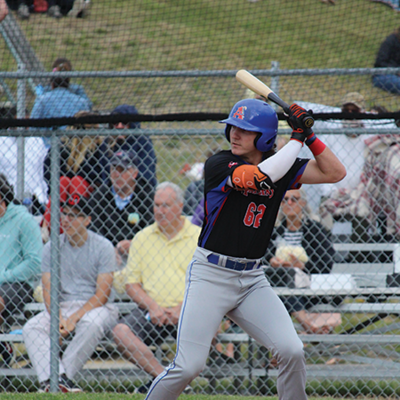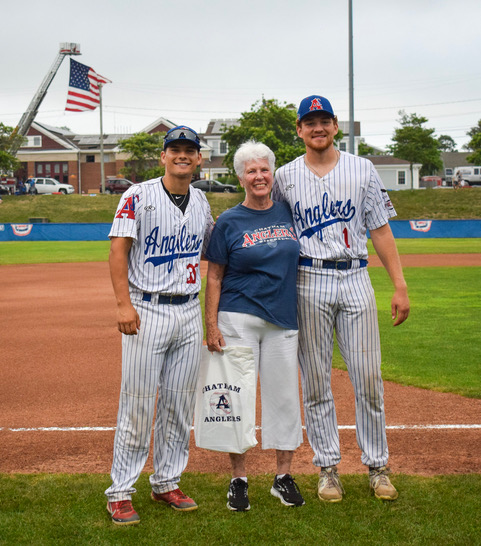Anglers News« Back to 2022 News Archives |
WIN Reality helps Marcus Brown, CCBL players hone in on their skills

Trapped in his apartment after a positive COVID-19 test in January, Marcus Brown brought the batting cage to his home.
He had recently received a package with an Oculus Quest, a gift from his first NIL deal with virtual reality training company WIN Reality. The glasses transformed Brown's hardwood floor into a batter's box, his living room into a collegiate stadium. He stayed in the digital world for hours each day, swinging at pitches with both hands on the controller.
'I was able to see live pitches before I even started to do intrasquad scrimmages in the spring,' Brown said.
Brown stands in his batting stance before each game, slowly moving his right hand across his body while he pictures a pitch coming straight at him. Orleans' Bennett Lee, another partner with WIN Reality, positions himself in front of the dugout before batting practice, envisioning a pitcher at home plate. But both players spent time perfecting their pitch recognition and decision making in the virtual landscape of WIN Reality over the past year.
WIN Reality was founded in 2018 by Chris O'Dowd, a former minor leaguer, and Dan O'Dowd, who served as the Colorado Rockies general manager from 1999 to 2014. According to Chief Operating Officer Ryan Bennett, who also played in the minor leagues, swing path training could only help batters so much.
'There was nothing to replicate in-game ' in-game speed pitches,' Bennett said. 'It was really (the founders') vision to make people better to not only see pitches, but be in rhythm with the pitcher.'
Five to 10 years ago, a virtual reality environment hardly existed, Bennett said. The release of the Oculus Quest 2 in October 2020 made the technology more accessible, allowing hitters like Brown and Lee to use the WIN Reality program anywhere, anytime. Since the sport itself keeps hitters stagnant in the batter's box, the technology was better served for baseball than any other game.
Gamification ' the tendency for companies to add point scoring and competition to products to help engagement ' has been one of the biggest challenges for the company, Bennett said. Instead of a training product, WIN Reality could have been seen as a video game. As a result, they started working with major league teams first, eventually moving to college programs to eliminate any stigma.
'If you look at the younger generation in general, they're used to gamification,' Bennett said. 'We want to make sure that it's a training product and that we're marrying the two together.'
Bennett said the product skyrocketed during the COVID-19 pandemic, as players couldn't practice together or, like Brown, were unable to leave their homes after a positive test result. Brown said the product could be helpful for teams in the northern part of the country which aren't able to practice outdoors due to winter weather.
WIN Reality has access to video of pitchers from roughly 50 college programs, placing them onto the virtual mound. Using data from TrackMan and Rapsodo, they're able to recreate pitch shape and speed, matching it to the video their users see.
Players can get at-bats against a starting pitcher they're facing on a Friday during the week leading up to the game, Brown said.
'If I'm facing a righty that's pitching 92 to 95 mph, I can put that exact pitcher on the VR,' Lee said.
The application goes further than giving 'live' at-bats though, providing a variety of modes to help batters hone in on specific skills. Brown and Lee utilize the disappearing pitch mode, which hides the last 10 to 15 feet of a pitch ' something that batters won't see anyway because of the speed. Batters need to answer where the pitch would've landed in the zone, using what they saw the pitcher's arm angle or grip.
'You have to see based on how the ball is traveling if it's going to be a fastball,' Brown said. 'It helps you as a baseball player because you're able to recognize spin early.'
Brown said that he improved on seeing breaking balls throughout his 2022 season at Oklahoma State. He realized pitches like a 12'6 curveball and slider came out of the same arm slot. Lee used the recognition mode to get his 'eyes ready' for game days at Tulane without experiencing the same physical exhaustion as a regular batting practice.
'In certain counts when you know if you're getting the breaking ball, you're able to know where it's coming in the zone,' Brown said.
After improving his pitch recognition, Brown notched 78 hits in 64 games at Oklahoma State this season. He arrived in Chatham after OSU failed to qualify for the NCAA Men's College World Series, starting at shortstop against Harwich on June 13.
In his second at-bat, Brown refrained from swinging on four out of the first five pitches, watching three land outside the zone. He eventually made contact with a pitch he liked, smacking a single between first and second base. The line-drive brought in two runs, giving Chatham a 3-1 lead which sustained during its first win of the year.
'Down the road, the decision making you have in the box is going to determine major steps in your career,' Brown said. 'Technology like this, it definitely helps.'

